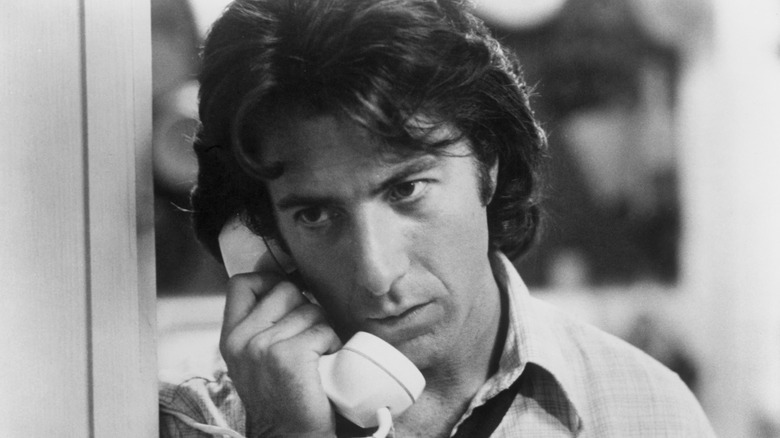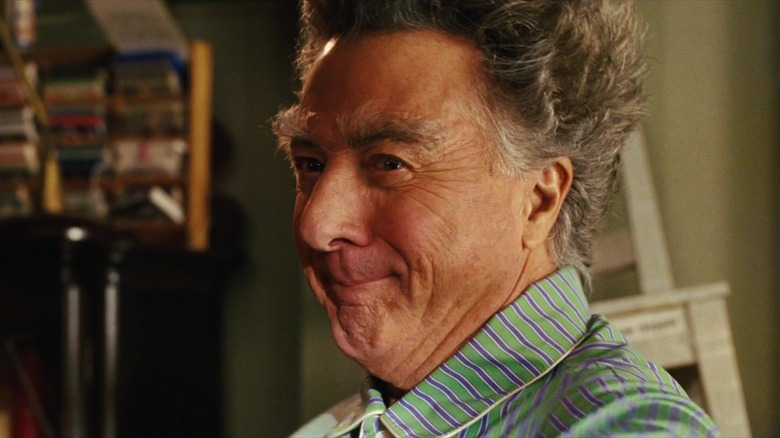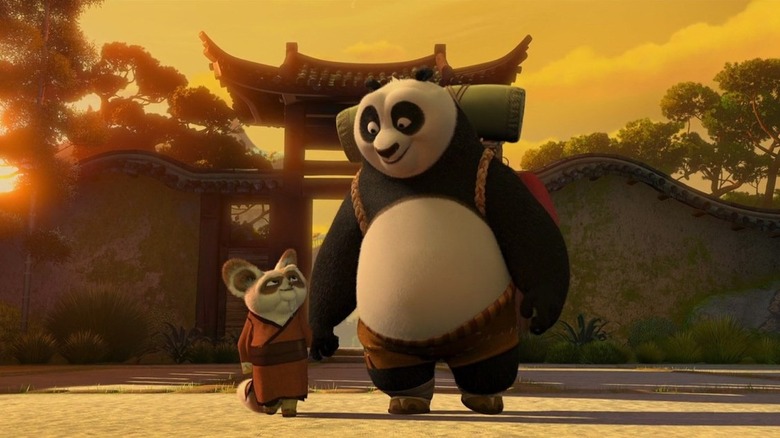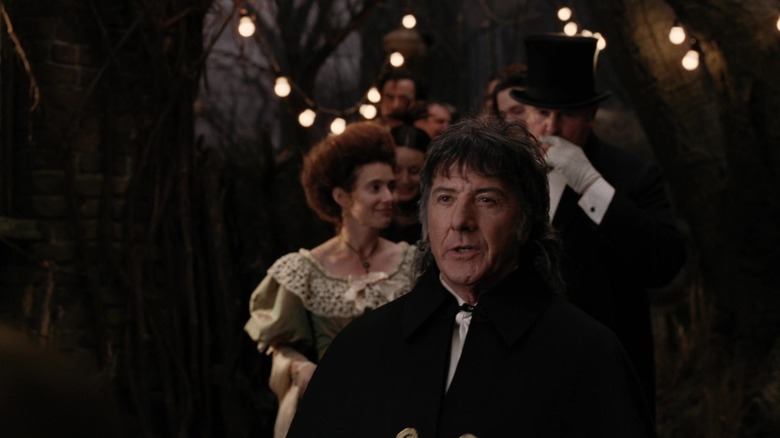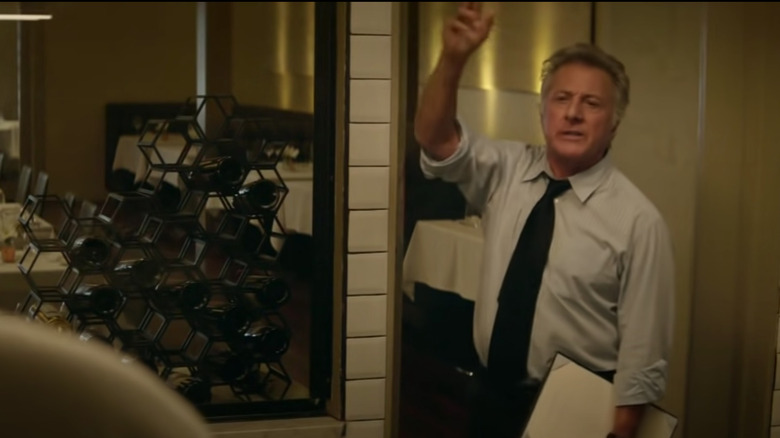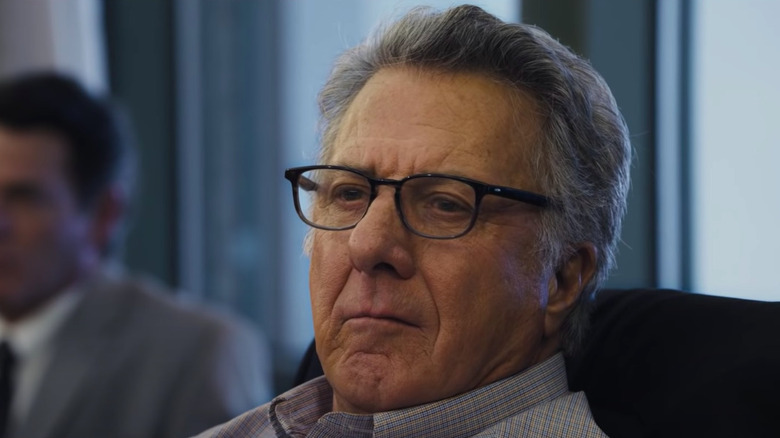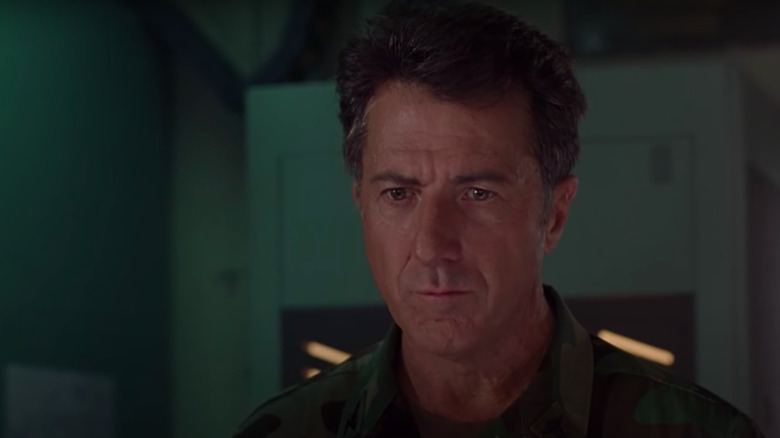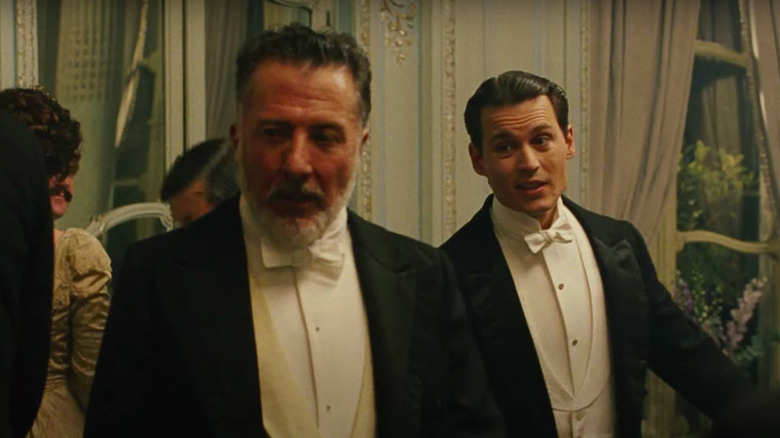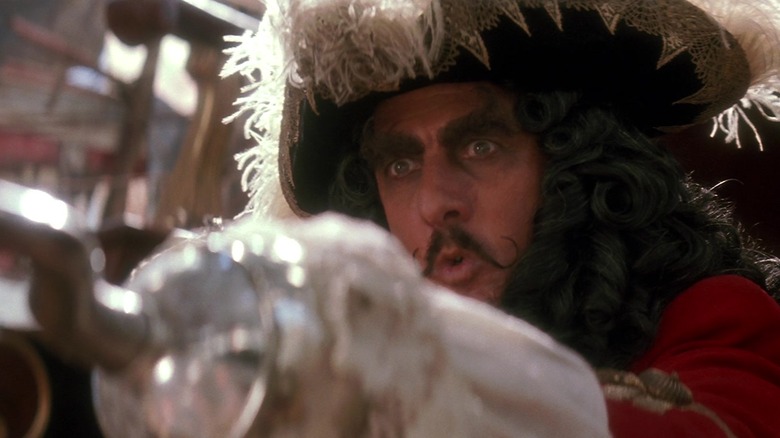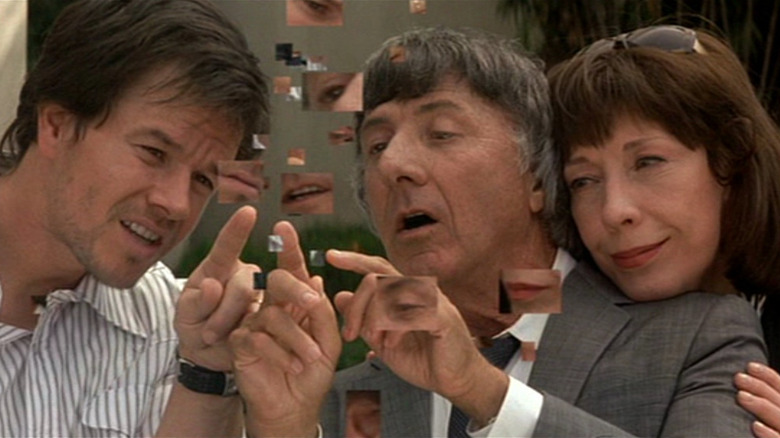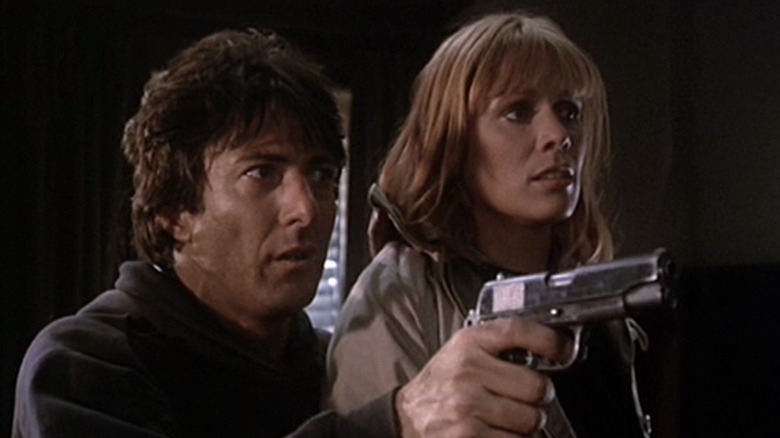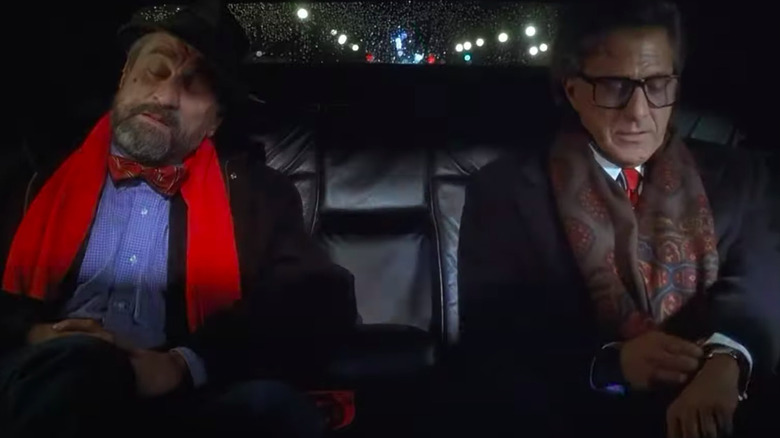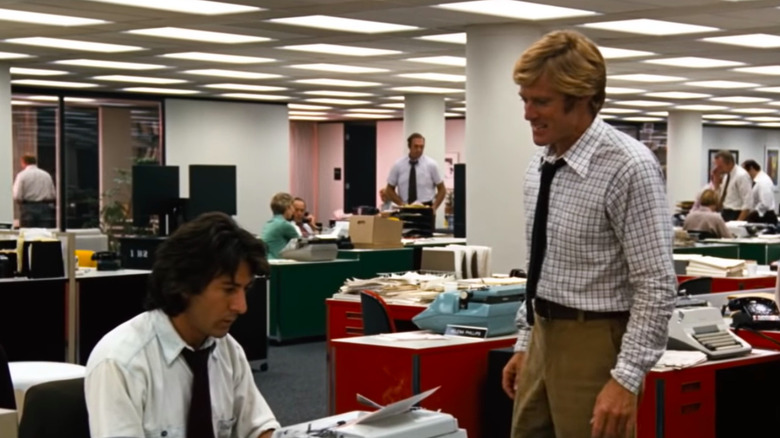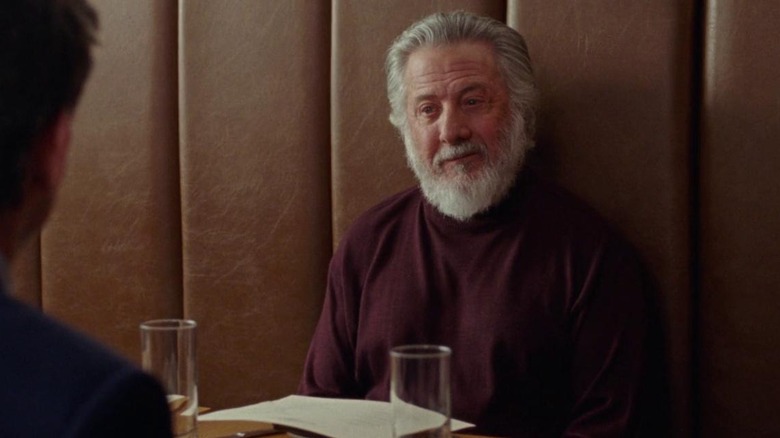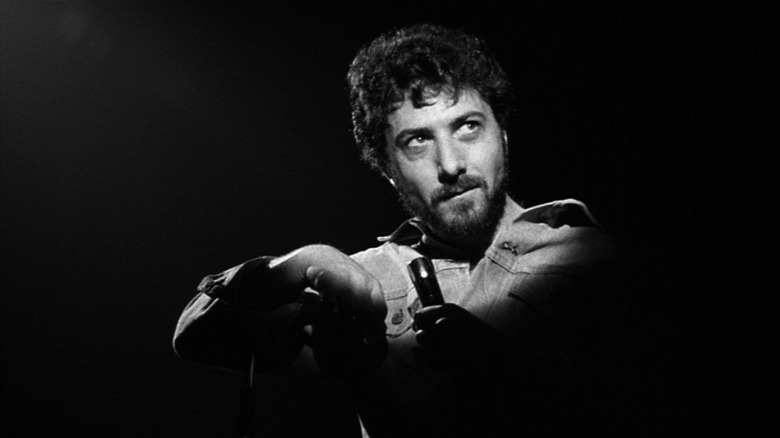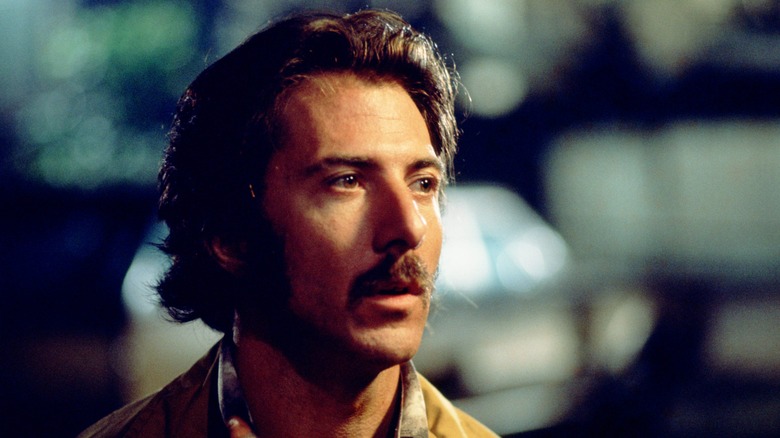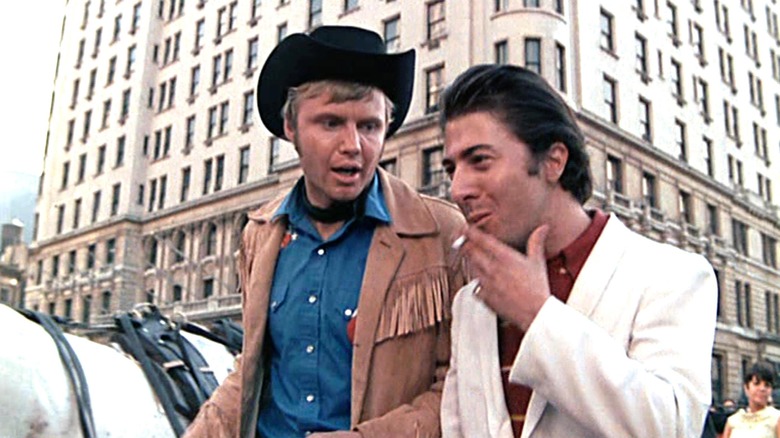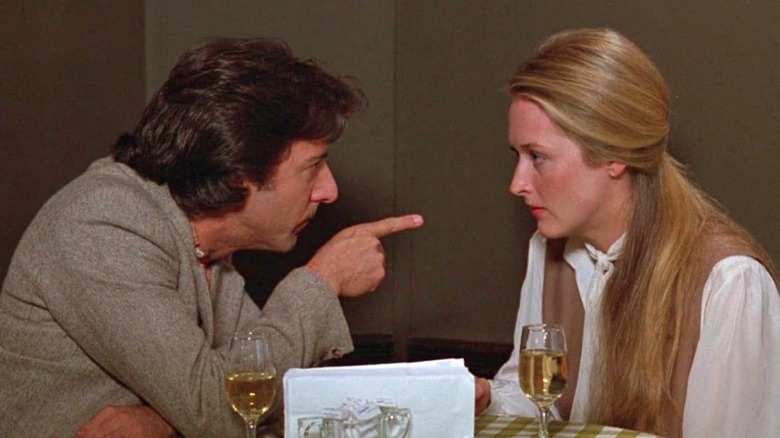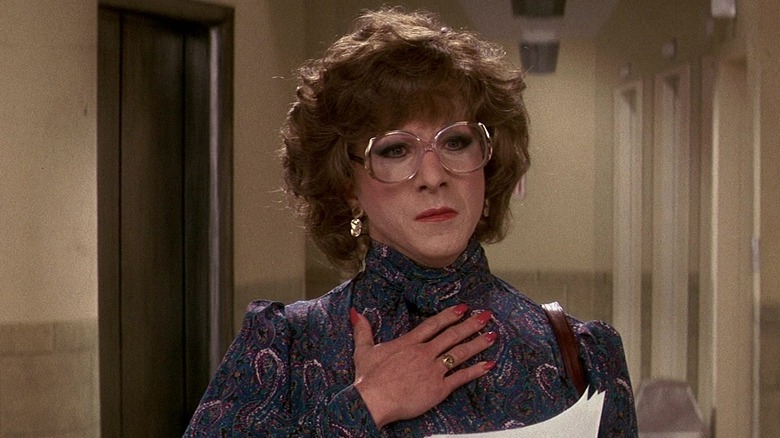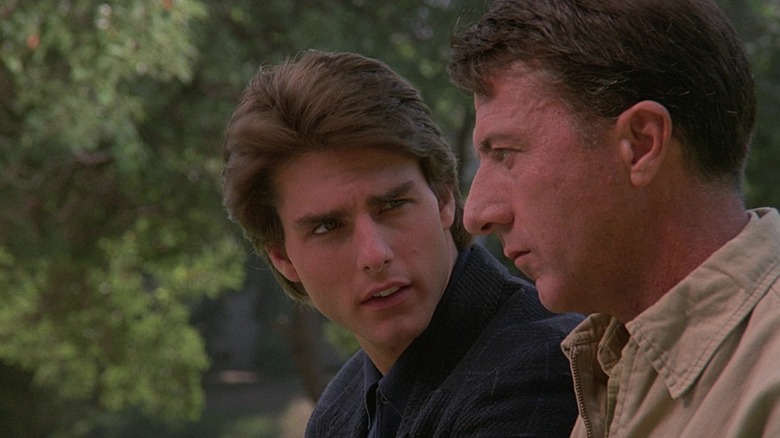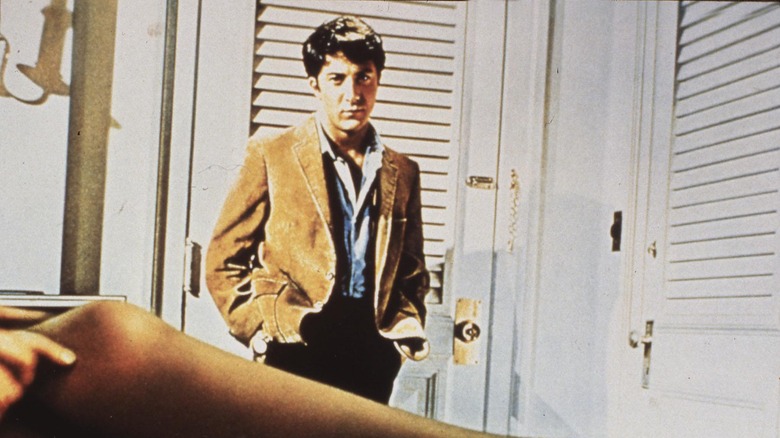The 20 Best Dustin Hoffman Movies Ranked
Dustin Hoffman is one of the most highly respected actors in Hollywood history, delivering great performances since the 1960s. Although he first started acting in off-Broadway productions, Hoffman quickly became an important figure in the New Hollywood era. New Hollywood, also known as the "American New Wave," was a generation of groundbreaking artists in the late 1960s and 1970s. Hoffman worked with many of the prominent directors, writers, and performers involved in the movement. What's more, he continues to challenge himself. In 2012, Hoffman made his feature film directorial debut with the historical dramedy "Quartet."
Some famous actors are known for playing only one type of character, but Hoffman is very versatile. There isn't a genre he hasn't tried at least once; Hoffman has starred in many dramas, comedies, musicals, and action films. He has introduced himself to a new generation through his appearances in recent family films. Impressively, the quality of his work has not changed.
Hoffman is the type of performer who is always memorable, no matter how significant his role is. Unsurprisingly, it is hard to narrow down the best performances of such a highly decorated actor. Here are the 20 best Dustin Hoffman movies ranked.
20. Mr. Magorium's Wonder Emporium
Dustin Hoffman has managed to reinvent himself for each generation. In 2007, he decided to have fun, and starred in the family-fantasy film "Mr. Magorium's Wonder Emporium." This genre of film was definitely a change of pace for him. "Mr. Magorium" is certainly not "The Graduate," but for younger viewers, it was the first time they saw Hoffman on screen.
Hoffman stars as the titular character, an eccentric toy store owner named Mr. Edward Magorium. Mr. Magorium has dedicated years of his life to running the shop, but he finally decides to retire. Mr. Magorium decides to bring in an accountant, Henry Weston (Jason Bateman), to settle his finances before he names a new owner. This sparks conflict with the shop's manager, Molly Mahoney (Natalie Portman). Molly loves what the store represents, but Henry does not believe in magic. When Mr. Magorium tragically dies, Molly and Henry must settle their differences, and save the business.
19. Kung Fu Panda
Mainstream animated films often feature voice-over performances from established actors. It is always nice to see a children's film where the vocal performers are taking the material seriously. The vocal cast members of the 2008 family film "Kung Fu Panda" helped create memorable characters for kids to enjoy. Dustin Hoffman voices Master Shifu, one of the most important characters in the film.
The film follows Po (Jack Black), a clumsy panda who dreams of becoming a warrior. After he attends a ceremony proclaiming which kung fu master is destined to defeat the villain Tai Lung (Ian McShane), Po is named the "Dragon Warrior" by Shifu. This infuriates Shifu's students. Tigress (Angeline Jolie), Mantis (Seth Rogen), Viper (Lucy Liu), Crane (David Cross), and Monkey (Jackie Chan) all feel that Po is unworthy of the title. However, Shifu shows kindness to Po, and, instead, teaches Po to refine his kung fu skills.
18. A Series of Unfortunate Events
While the Netflix series of the same name has become a success, the 2004 film "Lemony Snicket's A Series of Unfortunate Events" was the first adaptation of the popular children's adventure series. The film draws elements from Snicket's first three books, "The Bad Beginning," "The Reptile Room," and "The Wide Window." It served as a terrific origin story for what could have been an exciting film series; unfortunately, plans for a second installment stalled. While the Netflix version is the stronger adaptation, the film has many qualities that make it worth watching, in particular, Jim Carrey's incredible performance as the eccentric Count Olaf.
Carrey is clearly having a blast playing the villainous new caretaker of the three Baudelaire children. Klaus (Liam Aiken), Violet (Emily Browning), and Sunny (Kara and Shelby Hoffman) must escape Olaf's increasingly elaborate plans to torment them. During one of Olaf's most ridiculous schemes, he creates the elaborate stage show "The Marvelous Marriage" to celebrate his wedding to Violet. Dustin Hoffman has a "blink and you'll miss it" cameo as a member of the audience. It's strange to see such a famous actor briefly pop up, but it was perfect for the film's sporadic sense of humor.
17. Chef
The 2014 film "Chef" was a passion project for writer/director Jon Favreau. Known for his blockbusters, Favreau decided to create an independent movie instead, and the small-scale approach to "Chef was perfect, with the flick becoming one of Favreau's best films. He was clearly having a lot of fun telling a personal story. "Chef" features many extended cameos from well-known actors, including Dustin Hoffman.
Favreau stars as Carl Casper, an accomplished chef struggling to find inspiration. Casper feels creatively compromised by the strict menu of his employer, the Gauloises restaurant in California. Hoffman appears as the restaurant's owner, Riva. Riva is sick of hearing Casper's complaints. He orders Casper to stop experimenting and adhere to the assigned dinner menu.
Casper, of course, grows infuriated. He lashes out at Riva in a public outburst. It's a critical scene that sets up Casper's growth as a character. He ultimately decides to quit his job and buys a food truck to take a cross-country trip with his son, Percy (Emjay Anthony).
16. The Program
The 2016 biographical film "The Program" is one of the most underrated sports dramas of the past decade. The film explores the background of the Lance Armstrong scandal from the perspective of the journalist David Walsh. It was based on Walsh's 2012 novel "Seven Deadly Sins: My Pursuit of Lance Armstrong." Walsh had investigated Armstrong for over a decade before the truth about the doping scandal was revealed.
"The Program" explores the extent that Armstrong's cheating impacted the cycling world. Walsh (Chris O'Dowd) is nervous about accusing Armstrong (Ben Foster) because of his popularity. Armstrong became a cultural icon, and drew national attention to cycling. The promotional tycoon Bob Hamman (Dustin Hoffman) gives Walsh some much-needed insight about the damage that Armstrong could cause. He explains that a cheating scandal could disrupt the advertising revenue generated from cycling races. Even though he only briefly appears in the film, Hoffman embodies the cynicism of one of Armstrong's chief supporters.
15. Outbreak
The 1995 thriller "Outbreak" was eerily prophetic. While the film depicts a fictional disease pandemic, it is easy to draw comparisons to the COVID-19 crisis. The important themes of "Outbreak" still hold up in a modern context. The film shows the importance of listening to scientists, and the dangers of American militarism.
"Outbreak" begins by showing a disastrous military operation. A deadly virus is spreading throughout the African jungle. The U.S. Army decides to cover up the outbreak. Major General Donald McClintock (Donald Sutherland) and Brigadier General Billy Ford (Morgan Freeman) destroy a military compound infected by the virus. However, the sickness breaks out again 28 years later.
Dustin Hoffman stars as Colonel Sam Daniels, the virologist called in to stop the disease from spreading. Hoffman does a great job treating the medical profession with respect. Amidst a chaotic situation, Daniels is the voice of reason. He doesn't care about politics; all he wants to do is save lives.
14. Finding Neverland
Over a decade after he played the titular character in Steven Spielberg's 1991 film "Hook," Dustin Hoffman returned to the world of Peter Pan with the 2004 biographical drama "Finding Neverland." "Finding Neverland" explores the life of playwright J. M. Barrie (Johnny Depp), who created Peter Pan. The film shows the real family that inspired Barrie to create all the beloved characters. Barrie falls in love with the widow Sylvia Llewelyn Davies (Kate Winslet). He forms a tight bond with her four children George, Jack, Peter and Michael.
Hoffman has a critical role as the famous producer Charles Frohman. Although Frohman was wrapped up in the success of "Peter Pan," he was initially very skeptical of Barrie's play. Frohman did not believe that such a childish story would appeal to audiences. Hoffman did a great job bringing depth to Frohman. He's not dismissive or cruel to Barrie, but acknowledges the realities within the creative industry.
13. Hook
The 1991 fantasy epic "Hook" was a bold swing for both Dustin Hoffman and director Steven Spielberg. While many of Spielberg's past films were appealing to children, he had never made such a family-oriented project. Although Hoffman was already a comedy star, he had never given such an outlandish performance before. "Hook" could have very easily been a disaster. Who wants to see an older, more cynical version of Peter Pan? Surprisingly, "Hook" actually worked. Robin Williams was perfectly cast as the grown up version of the fairy tale character.
Even at the height of his stardom, Williams was outshined by Hoffman. Hoffman's eccentric performance as the iconic villain Captain Hook became the definitive version of the character. No previous incarnation had found the right mix of campiness and menace. In fact, the original 1953 Disney animated film is very problematic. Jude Law's performance in the 2022 film "Peter Pan & Wendy" will have to live up to the precedent that Hoffman established.
12. I Heart Huckabees
David O. Russell's 2004 dark comedy "I Heart Huckabees" is completely bonkers. The film satirized corporate corruption in the 21st Century, and the entire ensemble does a great job delivering O. Russell's absurd dialogue. While a film that relies so heavily on irony could have easily become grating, "I Heart Huckabees" manages to subvert expectations. Dustin Hoffman's chemistry with Lily Tomlin is one of the highlights of the film.
"I Heart Huckabees" follows the adventures of the self-described "existential detectives" Bernard (Hoffman) and Vivian Jaffe (Tomlin). The environmental executive Albert Markovski (Jason Schwartzman) reaches out to the detectives because he is convinced he's being followed. Albert is not entirely sure what to expect. The Jaffes decide to spy on him, claiming that it will help clear up any coincidences. Albert grows infuriated.
Hoffman and Tomlin are absolutely hilarious; even though the Jaffes are clearly incompetent, they take their work very seriously. It is amusing to see how effective their persuasion techniques are.
11. Marathon Man
American action cinema didn't really kick off until the 1980s, but there were still many gems in the 1970s. The 1976 thriller "Marathon Man" wasn't just an adrenaline-pumping action spectacle, even if it did contain more than a few amazing set pieces. The film reflected the political disenfranchisement and perpetual anxiety of the era. In the aftermath of the Kennedy assassination and the Watergate scandal, any film that tackled the subject of political conspiracies felt timely. "Marathon Man" works as both a thought-provoking reflection on the surveillance state and an exciting thriller.
Dustin Hoffman was very different from other action movie actors. He starred as the Ph.D. scholar Babe Levy, a history buff who is researching his father. Babe's father, H.V. (Allen Joseph), had mysteriously died during the investigations by Senator Joseph McCarthy in the 1950s. Babe suspects that his father may have been murdered. Babe's brother, Doc (Roy Scheider), is secretly a government spy trying to track down the escaped war criminal Dr. Christian Szell (Laurence Olivier). Szell escaped to South Africa after the end of World War II.
When Doc travels to New York City in anticipation of Szell's arrival, he pretends to be visiting his brother. Although he attempts to protect Babe, Doc is killed. Babe discovers his brother's dead body. He becomes wrapped up in Szell's plan to steal a collection of diamonds stolen from Auschwitz.
10. Wag the Dog
Political satire is hard to perfect. Obviously, any film that tackles this type of subject material is going to be controversial. Who doesn't love to argue about politics? Not every attempt to be satirical ages very well; if a film feels too reflective of the time it was created, it can feel very out-of-date in a modern context. However, the themes of militarism and media sensationalism in Barry Levinson's 1997 dark comedy "Wag the Dog" are eerily prophetic. Although it felt like an exaggeration of the Clinton administration when it was released, "Wag the Dog" now feels like a grim commentary on the Trump era.
The film explores the aftermath of a political scandal. The President of the United States has an affair with an underage girl. Despite the obvious comparisons that can be made now, "Wag the Dog" was actually released one month before the details of the Clinton-Lewinsky scandal emerged. The President's staff desperately tries to keep the story out of the news, and hires the professional media influencer Conrad Brean (Robert De Niro). Brean decides that the only way to direct citizens away from the President's misdeeds is to falsify a war. He enlists the help of the Hollywood producer Stanley Motss (Hoffman).
Initially, Brean and Motss' efforts are hilarious. However, when their fake war starts to have serious consequences, the film takes a much darker direction.
9. All The President's Men
It is very brave for a film to tackle events in recent history. There's always a risk that depicting recent events could feel like a sensationalist exploitation of recent headlines. Some films centered on recent news stories do not age well at all. However, Alan J. Pakula's 1976 biographical drama "All The President's Men" avoided these issues, and became a modern classic. The film's important message about the power of journalism within a democratic society is more timely than ever.
"All The President's Men" was inspired by the non-fiction book of the same name, written by "The Washington Post" journalists Carl Bernstein and Bob Woodward. Bernstein and Woodward wrote about their experiences breaking the "Watergate scandal." On June 17, 1972, five robbers broke into the Democratic National Committee office in Washington, D.C., and subsequently, President Richard Nixon and his administration attempted to cover up evidence of the attempted burglary. After Bernstein and Woodward revealed Nixon's involvement in the scandal, the President resigned from office.
The film explores the in-depth investigation that Bernstein (Dustin Hoffman) and Woodward (Robert Redford) conducted to research the historic political scandal. In the days before the Internet, all of their research had to be done in person. As they got closer to learning the details of the Nixon administration's ties to the crime, Bernstein and Woodward became convinced that their lives were in danger. Hoffman and Redford showed the courage that these real heroes faced in the wake of potential danger.
8. The Meyerowitz Stories (New and Selected)
It is always nice when a legacy actor gets the chance to share the screen with the next generation. While Dustin Hoffman has appeared in many recent films, his role in Noah Baumbach's 2017 dramedy "The Meyerowitz Stories (New and Selected)" ranks among his best work. The film itself explores the concept of legacy. It gave Hoffman the chance to reflect on how he's evolved as an actor.
"The Meyerowitz Stories" chronicles the trials and tribulations of an eccentric New York family. Harold Meyerowitz (Hoffman) is a successful modeler, who has recently retired from teaching college classes. He is preparing for the launch of a gallery that honors his achievements, and his children gather to prepare for the celebration. They each are going through personal hardships of their own.
Danny (Adam Sandler) has serious anger issues. He fears for his daughter Eliza (Grace Van Patten) as she prepares for college. Jean (Elizabeth Marvel) is still traumatized from a childhood incident involving a close personal friend of her father's. Matthew (Ben Stiller) has found professional success selling homes, but has a challenging family life. The children bicker and argue when they first reunite, however, they discover that they actually have more in common with each other than they ever expected when they were young. Hoffman serves as the perfect anchor point for the story.
7. Lenny
Capturing the essence of a real person in a biographical film is always a challenge. It's even more difficult when the subject is a well-known figure within the entertainment industry. An actor isn't just required to faithfully depict a subject's life; they must live up to their performance quality. It was certainly a risky endeavor for Dustin Hoffman to take on the role of the legendary comedian Lenny Bruce in Bob Fosse's 1974 film "Lenny." Bruce was a groundbreaking performer, whose crude content and satirical routines generated significant controversy. In fact, many modern comedians still cite Bruce's bravery as an inspiration.
Even though it is a film about the world of stand-up comedy, "Lenny" isn't very funny. Fosse explored the personal torment that Bruce went through, both emotionally and creatively. The foul-mouth, ill-tempered persona that he created on stage becomes all-consuming. Bruce feels like he's constantly giving a performance. He realizes that he's started to bring the same anger he generates on stage into all aspects of his life. He feeds off of the controversy, and intentionally provokes people. Bruce spirals into depression.
Hoffman captures the struggles within Bruce's life. Bruce is desperate to stir people up, and as a result, he secludes himself from everyone that cares about him. Bruce wants to be taken seriously — he sees his satirical material as an opportunity to spark conversations and create change. Bruce becomes infuriated when people tell him to "stick to comedy." Fosse captures the isolation of being a performer.
6. Straight Time
Great method actors don't always make great directors. Marlon Brando only did it once, and while the film he shot is pretty spiffy ("One-Eyed Jacks"), he did not enjoy the experience. "You work yourself to death," he told Rolling Stone. So it's not surprising that Dustin Hoffman, at the height of his method madness (i.e. two years after Lawrence Olivier asked him "Dear boy, why don't you try acting" on the set of "Marathon Man"), essentially lost his first directing gig on day one of "Straight Time" when his nervy indecisiveness resulted in not a single usable frame.
Hoffman's friend Ulu Grosbard mercifully stepped in to direct, allowing Hoffman to go deep, deep into character as a career thief attempting to live by the rule of the law after a lengthy prison sentence. Max Dembo is one of the meatiest characters Hoffman ever inhabited, and he transfixes us with this cocky screw-up who hasn't a prayer of keeping his nose clean. Watching Hoffman bounce off a needling parole officer played to nerve-rattling perfection by M. Emmet Walsh is an invigorating contrast in styles, and his quiet scenes with Theresa Russell are surprisingly tender. Hoffman's never been better.
5. Midnight Cowboy
Hollywood has a long history of censorship based on content that is deemed "offensive" or "inappropriate." Before the Motion Picture Association introduced the new NC-17 rating, films with the highest amount of adult content received the "X" rating. Filmmakers were terrified of being rated X, because many audiences would simply assume that their film was pornographic, confusing it with "XXX." Many films were significantly edited down in order to receive an R rating. However, the 1969 drama "Midnight Cowboy" was the rare X-rated film that became a mainstream hit. It is the only X-rated film to ever win the Academy Award for best picture.
"Midnight Cowboy" broke stereotypes about the rating; it wasn't exploitative, and told an important story about economic disparity. The entire cast did a phenomenal job at treating the sensitive subject material with respect. The film follows the young blue-collar worker Joe Buck (Jon Voight), who moves from Texas to New York City to look for work. Desperate for income, Joe decides to become a male gigolo. The lifestyle is even more grueling than what he expected.
During his stay, Joe befriends the con man Enrico Salvatore Rizzo (Dustin Hoffman), who goes by the nickname "Ratso." Ratso steals Joe's money, leaving him to wander the streets alone. When he finally tracks Ratso down, Joe surprisingly befriends the troubled man. They are both just trying to survive, and decide to live together. Although the film is quite disturbing at times, Joe and Ratsos' friendship is very heartfelt.
4. Kramer vs. Kramer
In any film that centers on divorce, it is necessary for both parties to be represented equally. It would not be cinematically interesting for a film to simply choose one side over the other. However, this type of nuanced perspective was rare in the 1970s. Due to the discrimination within the industry, many films adhered to outdated gender stereotypes. The 1979 romantic drama "Kramer vs. Kramer" did not conform to this tired tradition. The film sensitively explored a child custody case, and was respectful in its depiction of both parents. Both Dustin Hoffman and his co-star Meryl Streep took home the Academy Awards for best actor and best supporting actress, respectively.
"Kramer vs. Kramer" follows the troubled couple Ted (Hoffman) and Joanna Kramer (Streep). Ted is a workaholic who spends very little time at home with his wife and their young son, Billy (Justin Henry). One night, Ted comes home to share the news that his advertising firm has landed an important account. However, he is shocked to learn that Joanna is leaving him, leaving Ted to take care of Billy by himself. While he's very successful professionally, Ted doesn't know anything about raising a young boy. He discovers that he has missed out on almost all of Billy's childhood thus far.
Hoffman does a great job at making Ted a complex character. Initially, his ignorance makes him completely unlikable. However, Ted becomes more empathetic as he spends time with Billy.
3. Tootsie
It is always admirable when an actor is willing to take risks. Dustin Hoffman's performance in the 1982 comedy "Tootsie" could have very easily been perceived as offensive or unconvincing. The film asked the audience to believe that a talented working actor could feasibly disguise himself as a woman for an extended period of time. What could have been a series of cheap jokes actually became a classic comedy of errors. Hoffman didn't just create an instantly iconic character; he explored the struggles that women go through in the entertainment industry.
"Tootsie" follows the accomplished actor Michael Dorsey (Hoffman), who is unable to find his next role. Michael has earned the reputation of being difficult to work with, yet he is desperate for any role he can get. After he learns that the daytime soap opera "Southwest General" is adding new cast members, Michael decides to audition. He disguises himself as a woman to play the nurse Emily Kimberly. To his surprise, he is hired as a recurring cast member on the show. Everyone assumes Michael is a woman while he is at work.
Michael recognizes the misogyny within the show's scripts. Instead of adhering to the lines he is given, Michael reinvents the character of Emily as a confident, spunky supporter of the women's liberation movement. While this disturbs the show's producers, fans of "Southwest General" love the new direction. Michael discovers that he has inspired change within the industry.
2. Rain Man
The term "crowdpleaser" can be somewhat misleading. Just because a film appeals to a wide audience does not mean it has artistic merit. Compared to other films that have won the Academy Award for best picture, 1988's "Rain Man" is not very complex — it tells a relatively straightforward story of familial bonding. However, there is emotional depth within the characters of "Rain Man." The film explores how the experiences of childhood can continue to impact siblings when they grow up.
At the center of "Rain Man" are two amazing performances. Tom Cruise stars as the highly successful Los Angeles car dealer Charlie Babbitt. Charlie is almost entirely focused on his career. He has not spoken to his father, Sanford, in years. When Charlie receives news that his father has passed away, he travels to Cincinnati with his girlfriend Susanna (Valeria Golino) to attend the funeral. Charlie begins to settle his father's estates. He discovers that a large amount of money is being redirected to a mental institution. Charlie learns that he has an estranged brother, Raymond (Dustin Hoffman), who has autism and savant syndrome. He rarely leaves the parameters of the institution.
Charlie is initially nervous about taking care of Raymond, but they slowly begin to bond. Charlie discovers that his older brother has incredible mathematics skills. In an amusing sequence, Charlie takes Raymond to Las Vegas to count cards. Their relationship is both funny and poignant.
1. The Graduate
"The Graduate" is one of the most influential romantic comedies ever made. Mike Nichols' groundbreaking 1967 classic perfected the rom-com formula, satirizing youthful idealism and the realities of life after college. "The Graduate" is ranked #17 on the American Film Institute's list of the 100 greatest films of all-time, and it's easy to see why it is so beloved. Over 50 years later, "The Graduate" is just as hilarious as it was during its initial release.
The film follows the recent college graduate Benjamin Braddock (Dustin Hoffman). Benjamin returns to his parents' home in Pasadena, California, after earning his bachelor's degree. While his parents are excited about the possibilities ahead of him, Benjamin is unsure what he wants to do with his future. He feels very uncomfortable when his parents throw him a lavish graduation party. Benjamin meets the older woman Mrs. Robinson (Anne Bancroft), who seduces him, and the pair begin having an affair.
Benjamin feels like Mrs. Robinson understands him better than any of his peers, and she opens up to Benjamin, too. She tells him that she never intended to become pregnant with her daughter, Elaine (Katherine Ross). When Benjamin gets the chance to meet Elaine, he's instantly smitten with her. Now, he must decide between two generations of women. Hoffman brings out Benjamin's affable qualities. His awkward nature is perfect as Benjamin attempts to hide his two relationships.
